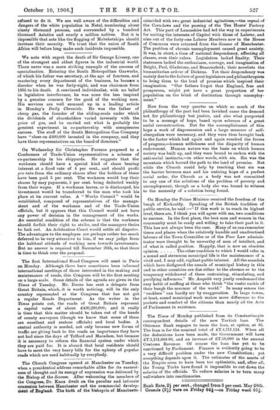The Church Congress opened at Manchester on Tuesday, when a
presidential address remarkable alike for its earnest- ness of thought and its energy of expression was delivered by the Bishop of the diocese. After welcoming the members of the Congress, Dr. Knox dwelt on the peculiar and intimate connexion between Manchester and the commercial develop- Mont of England. The birth of the bishopric of Manchester coincided with two great industrial agitations,—the repeal of the Corn-laws and the passing of the Ten lionrs' Factory Act. This part of Lancashire had led the way in experiments for uniting the interests of Capital with those of Labour, and nine out of the forty-one Labour Members now in the House of Commons were returned from the diocese of Manchester. The problem of chronic unemployment caused great anxiety. It was, in short, a time of national despondency, affecting all classes, even their rulers. Legislation lacked finality. Their statesmen lacked the enthusiasm, courage, and imagination of Bright, Peel, Gladstone, and Beaconsfield; their novelists the humanitarian ardour of Dickens. Yet their despondency was mainly due to the failure of great legislators and philanthropist* to bring them to the land of promise whioh inspired their imagination. "Our fathers forgot that England, free and prosperous, might yet have a great proportion of her population on the brink of destitution through unemploy- ment."














































 Previous page
Previous page